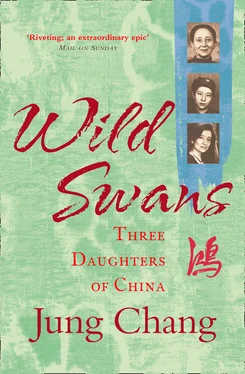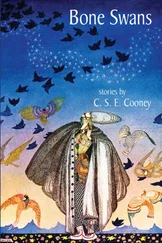Among those who could not make ends meet were the teachers. They had been demanding a pay rise, to which the government responded by increasing tuition fees. This had little effect, because the parents could not afford to pay more. A teacher at my mother’s school died of food poisoning after eating a piece of meat he had picked up off the street. He knew the meat was rotten, but he was so hungry he thought he would take a chance.
By now my mother had become the president of the students’ union. Her Party controller, Liang, had given her instructions to try to win over the teachers as well as the students, and she set about organizing a campaign to get people to donate money for the teaching staff. She and some other girls would go to cinemas and theatres and before the performances started they would appeal for donations. They also put on song-and-dance shows and ran rummage sales, but the returns were paltry—people were either too poor or too mean.
One day she bumped into a friend of hers who was the granddaughter of a brigade commander and was married to a Kuomintang officer. The friend told her there was going to be a banquet that evening for about fifty officers and their wives in a smart restaurant in town. In those days there was a lot of entertaining going on among Kuomintang officials. My mother raced off to her school and contacted as many people as she could. She told them to gather at 5 p.m. in front of the city’s most prominent landmark, the sixty-foot-high eleventh-century stone drum tower. When she got there, at the head of a sizable contingent, there were over a hundred girls waiting for her orders. She told them her plan. At around six o’clock they saw large numbers of officers arriving in carriages and rickshaws. The women were dressed to the nines, wearing silk and satin and jingling with jewellery.
When my mother judged that the diners would be well into their food and drink, she and some of the girls filed into the restaurant. Kuomintang decadence was such that security was unbelievably lax. My mother climbed onto a chair, her simple dark blue cotton gown making her the image of austerity among the brightly embroidered silks and jewels. She made a brief speech about how hard up the teachers were, and finished with the words: ‘We all know you are generous people. You must be very pleased to have this opportunity to open your pockets and show your generosity.’
The officers were in a spot. None of them wanted to look mean. In fact, they more or less had to try to show off. And, of course, they wanted to get rid of the unwelcome intruders. The girls went round the heavily laden tables and made a note of each officer’s contribution. Then, first thing next morning, they went round to the officers’ homes and collected their pledges. The teachers were enormously grateful to the girls, who delivered the money to them right away, so it could be used before its value was wiped out, which would be within hours.
There was no retribution against my mother, perhaps because the diners were ashamed of being caught like this, and did not want to bring further embarrassment on themselves—although, of course, the whole town knew about it at once. My mother had successfully turned the rules of the game against them. She was appalled by the casual extravagance of the Kuomintang elite while people were starving to death in the streets—and this made her even more committed to the Communists.
As food was the problem inside the city, so clothing was in desperately short supply outside, as the Kuomintang had placed a ban on selling textiles to the countryside. As a watchman on the gates, ‘Loyalty’ Pei-o’s main job was to stop textiles being smuggled out of the city and sold to the Communists. The smugglers were a mixture of black marketeers, men working for Kuomintang officials, and underground Communists.
The usual procedure was that ‘Loyalty’ and his colleagues would stop the carts and confiscate the cloth, then release the smuggler in the hope that he would come back with another load which they could also seize. Sometimes they had a deal with the smugglers for a percentage. Whether they had a deal or not, the guards would sell the cloth to the Communist-controlled areas anyway. ‘Loyalty’ and his colleagues waxed fat.
One night a dirty, nondescript cart rolled up at the gate where ‘Loyalty’ was on duty. He performed his customary charade, poking the pile of cloth on the back while he swaggered around, hoping to intimidate the driver and soften him up for an advantageous deal. As he sized up the value of the load and the likely resistance of the driver, he was also hoping to engage him in conversation and find out who his employer was. ‘Loyalty’ took his time because this was a big consignment, more than he could get out of the city before dawn.
He got up beside the driver and ordered him to turn around and take the consignment back into the city. The driver, accustomed to being on the receiving end of arbitrary instructions, did as he was told.
My grandmother was sound asleep in bed when she heard banging on the door at about 1 a.m. When she opened it, she found ‘Loyalty’ standing there. He said he wanted to leave the cartload at the house for the night. My grandmother had to agree, because the Chinese tradition made it virtually impossible to say no to a relation. The obligation to one’s family and relatives always took precedence over one’s own moral judgment. She did not tell Dr Xia, who was still asleep.
Well before daybreak ‘Loyalty’ reappeared with two carts; he transferred the consignment onto them and drove off just as dawn was beginning to light up the sky. Less than half an hour later armed police appeared and cordoned off the house. The cart driver, who had been working for another intelligence system, had informed his patrons. Naturally, they wanted their merchandise back.
Dr Xia and my grandmother were quite put out, but at least the goods had disappeared. For my mother, though, the raid was almost a catastrophe. She had some Communist leaflets hidden in the house, and as soon as the police appeared, she grabbed the leaflets and raced to the toilet, where she pushed them down her padded trousers which were tightened round the ankles to conserve heat, and put on a heavy winter coat. Then she sauntered out as nonchalantly as she could, pretending she was on her way to school. The policemen stopped her and said they were going to search her. She screamed at them that she would tell her ‘Uncle’ Zhu-ge how they had treated her.
Up to that moment the policemen had had no idea about the family’s intelligence connections. Nor had they any idea who had confiscated the textiles. The administration of Jinzhou was in utter confusion because of the enormous number of different Kuomintang units stationed in the city and because anyone with a gun and some sort of protection enjoyed arbitrary power. When ‘Loyalty’ and his men had appropriated this load the driver did not ask them who they were working for.
The moment my mother mentioned Zhu-ge’s name, there was a change in the attitude of the officer. Zhu-ge was a friend of his boss. At a signal, his subordinates lowered their guns and dropped their insolently challenging manner. The officer bowed stiffly and muttered profuse apologies for disturbing such an august family. The rank-and-file police looked even more disappointed than their commander—no booty meant no money, and no money meant no food. They shambled off sullenly, dragging their feet as they went.
At the time there was a new university, the Northeast Exile University, in Jinzhou, formed around students and teachers who had fled Communist-occupied northern Manchuria. Communist policies there had often been harsh; many landowners had been killed. In the towns, even small factory owners and shopkeepers were denounced and their property was confiscated. Most intellectuals came from relatively well-to-do families, and many had seen their families suffer under Communist rule or been denounced themselves.
Читать дальше












